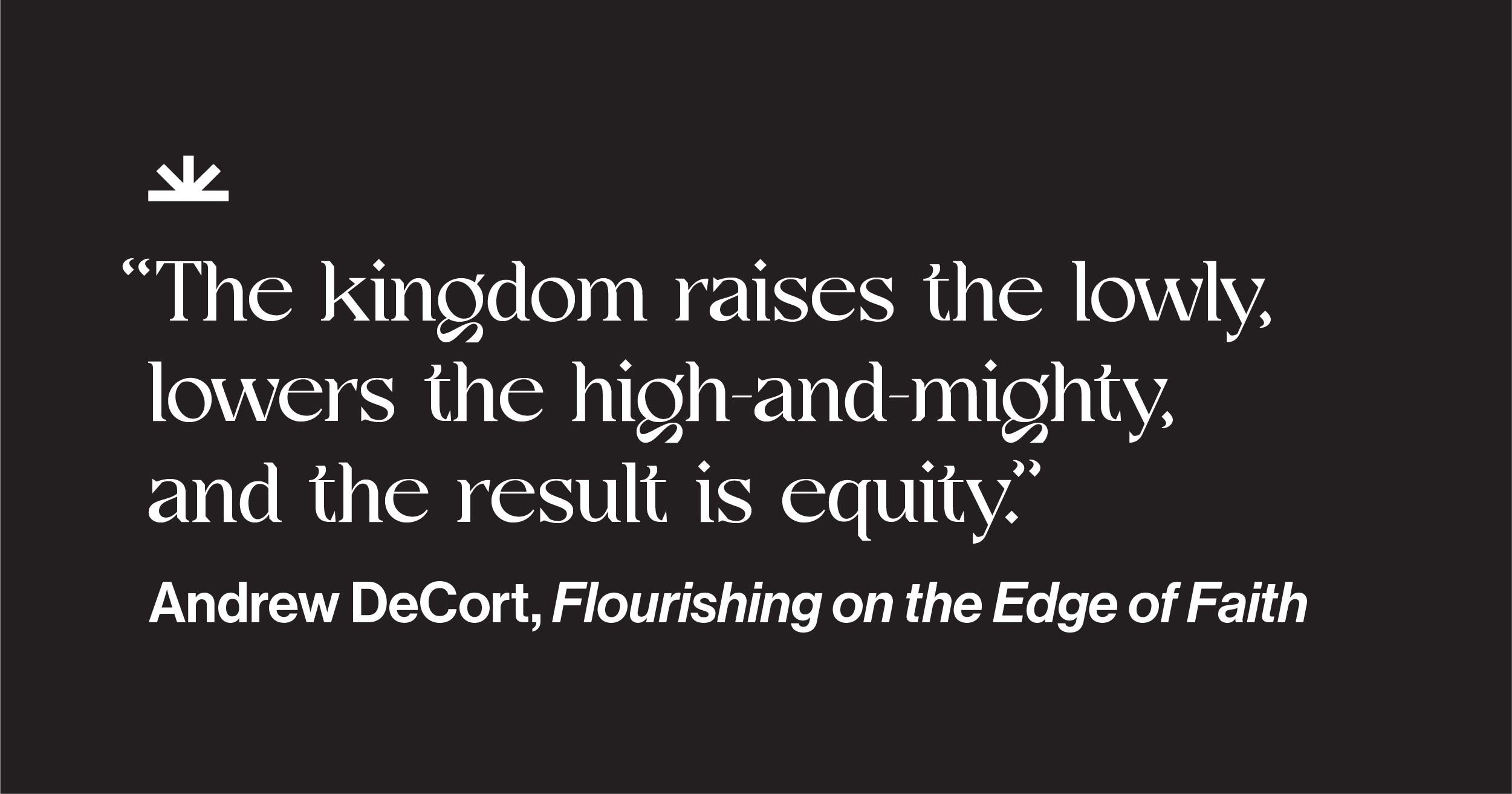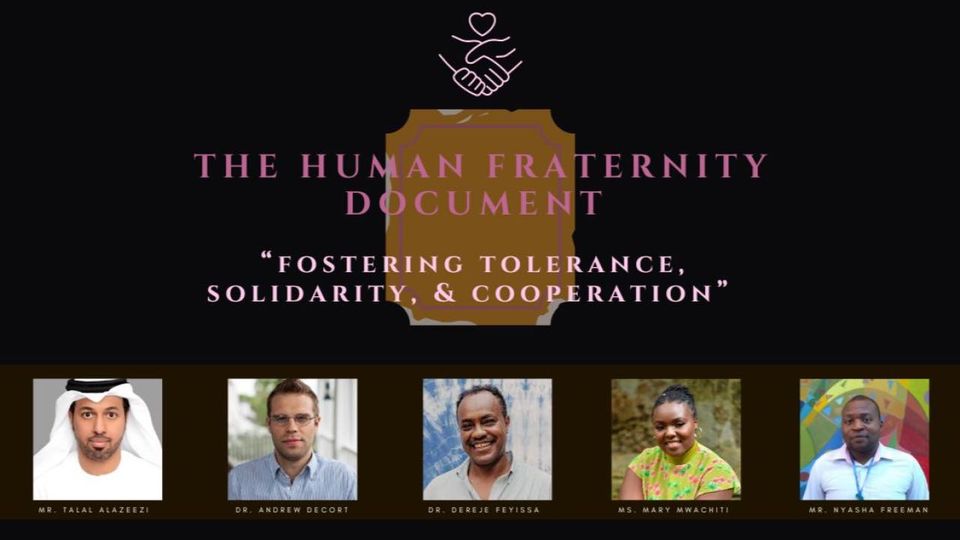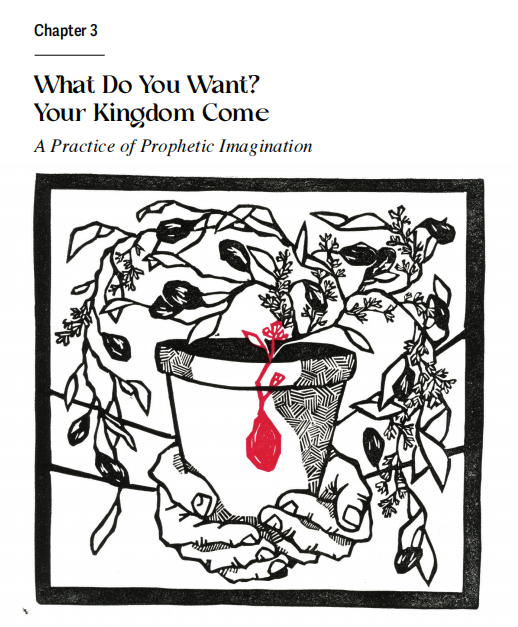Dear friends,
What did the kingdom of God mean to Jesus? And what are we desiring when we make our lives a prayer for it to come on earth?
These questions probe to the heart of Jesus’s third spiritual practice: “Your kingdom come, your will be done, on earth as it is in heaven.” In the excerpt below from Flourishing on the Edge of Faith, I unpack the first and most important sign of God’s kingdom according to Jesus: countercultural love.

Jesus’s vision of the kingdom is so beautiful, so surprising, and so hopeful. This week, I hope you’ll join me in practicing Jesus’s prayer every day and let the kingdom of God infiltrate your desire.
A quick update first…
Last week, the United Arab Emirates Embassy in Ethiopia invited me to speak at their Human Fraternity Webinar. The topic was how faith can foster a culture of tolerance, solidarity, and cooperation in Ethiopia and around the world. 
This was a very timely conversation. Sadly, just over the weekend, an emerging church conflict in Ethiopia led to violence and death. Many are concerned this conflict could escalate further and lead to more bloodshed in Ethiopia.
I hope my simple message can encourage a spirit of compassion, humility, and shared dignity in this sensitive moment. My talk was titled “‘You Are My Beloved Children’: A Sacred Voice that Can Heal Othering and Unlock Interfaith Flourishing.” If you want to listen in, the talk is available on my YouTube channel. Here is the heart of it:
When we know that we are loved, we unlock the compassion to feel the pain of others. Our hearts are softened to feel the pain even of our “enemies.” They are also made and loved by God. Slowly, I take no pleasure in their pain. The thought of another person suffering becomes disgusting to me. Compassion goes deeper than my passion. Hate becomes a sickening poison. I let go of my hard heart. I discover what Jesus taught: we meet God in the hungry, the thirsty, the naked, the sick, the outsider, and the prisoner.
Please join me in praying for peace in Ethiopia and each of our lives.
May God’s kingdom come and may we flourish together,
Andrew
“Sign 1: Countercultural Love”

The kingdom of God is like a tiny seed buried in soil that branches out with beauty and fruitfulness. Original artwork by Holly Harris
To understand God’s kingdom, we need to work backwards. The last sign is really the first and shows us the heart of all the others. It takes us back to Jesus’s baptism and re-immerses us in our divine belovedness, especially when we’re afraid that we’re failed and finished.
Jesus said surprisingly little about the end of the world. But the single story he tells about it reveals the soul of God’s kingdom. And that soul is countercultural love. As Howard Thurman wrote, “The religion of Jesus makes the love-ethic central.”
Here’s the story.
On the last day of history, “all the nations” of the world are gathered before the King’s throne for final judgment. This is the global moment when God’s ultimate desire and what lasts forever is unveiled for literally everyone to see.
The King declares to those on his right, “Come, you who are blessed by my Father. Take your inheritance: the kingdom prepared for you since the creation of the world.” The King then explains why these particular people belong:
“I was hungry and you gave me something to eat. I was thirsty and you gave me something to drink. I was a foreigner and you invited me in. I needed clothes and you clothed me. I was sick and you looked after me. I was in prison and you came to visit me.” (Matthew 25:35-36)
The citizens of the kingdom then confess their confusion. They don’t remember ever seeing or serving the King in these desperate conditions. And, refreshingly, they’re honest enough to admit it.
Their confusion leads to the climax of the story. The King answers, “Whatever you did for one of the least of these siblings of mine, you did for me” (Matthew 25:40).
Shockingly, the King in the privileged position of ultimate Judge identifies himself with abused and abandoned people: they count for him. And so the kingdom’s citizens actually embraced the King whenever they embraced these people, even though they didn’t realize it.
For Jesus, love is what matters and saves, not spiritual transactions to get an inside connection with “God.” As the African theologian Augustine wrote, “If God is love, whoever loves love loves God.”
The kingdom’s revaluation of the unwanted and those who love them shouldn’t surprise us. Recall that Jesus began by teaching us to talk to God as our Father. And so he calls the erased and excluded nobodies precious sisters and brothers in God’s kingdom. They’re at the heart of God’s new we.
So this is how the citizens of the kingdom get identified when all the masks finally come off: they practice divine belovedness with people who are hungry, thirsty, foreign, unclothed, sick, and incarcerated. They cherish and embrace unwanted people as embodiments of God. They see Peniel – the Face of God – in these people, even if they wouldn’t say it that way.
Like traditional Christianity teaches, then, Jesus indicates that our belonging in the kingdom is based on how we respond to divinity. But Jesus slants this orthodoxy in a surprising way. True divinity isn’t primarily accessed in pious prayers and religious services addressed to the unhallowed “God” that Isaiah critiqued. True divinity is found in suffering people and the love that beholds them as precious. The disinherited are the gatekeepers of the kingdom.
I’ve lived much of my adult life working in a war-torn country surrounded by failed states in a region that mass-produces refugees and traffics in human bodies. The people Jesus names in this story sound to me like victims of war. They’ve lost everything and are utterly dependent for their most basic needs. They’re stripped of any status or recognizable belonging. They’re what we today call stateless persons without any documentation. They’ve contracted diseases and been punished by the state.
We’ve seen already that Jesus grew up in an occupied territory of Rome’s violent empire. He himself was one of these people – from his earliest memories as a displaced massacre survivor until his state-sanctioned execution. So Jesus boldly names these suffering people as the first citizens of God’s kingdom. They’re also the key to enter it for everyone else.
I also spend regular time with people at a homeless shelter called Hesed House. Many of these people have histories of devastating loss, severe trauma, mental illness, drug addiction, and prison time. As Derek slowly smoked a cigarette in the cold, he told me about the death of his seven-year-old daughter Jessica. He was estranged from his wife, she was addicted to drugs, and Jessica wasted away until she died. Derek’s eyes filled with tears, and his drunken voice slurred as he told me, “I’ve hit rock bottom.”
The kingdom’s VIP list reminds me of Jessica, Derek, and the people at Hesed House. Jesus’s practice of hanging out with people like them is how he got his infamous reputation as a “friend of drunks and sinners.” As we’ve seen, the audience who originally heard Jesus teach his prayer included survivors of trauma and mental illness. In fact, Jesus experienced homelessness himself and attracted homeless people like a magnet.
In each of them, Jesus saw Peniels and the inheritors of God’s dream for the world. And so he says that the kingdom welcomes people so overwhelmed with loss, so mentally ill, so felonized and afflicted that they can’t even keep clothes on their backs or a roof over their heads. The kingdom of heaven is the place where these people are family and finally feel at home.
For everyone else, embodying love for these sacred sisters and brothers is the key to the kingdom. If these are the kinds of people you champion and dream of being lifted up, you’ll be overjoyed and at home in the kingdom too. If you don’t really care or think they don’t deserve it, God’s kingdom may not be the place you want to be forever. Here we see again the centrality of our desire and the fierceness of Jesus’s honesty: some of us don’t actually want this to happen (Matthew 25:41-46).
But Jesus insists that it will, and he beautifully promises that the kingdom will gather Peniels – glimmers of God’s Face – from the four corners of the earth. In the end, the kingdom will be the ultimate global party where strangers are reunited as a family of countercultural love and the earth’s full diversity. This is where it all ends. This is God’s dream. Martin Luther King called it “cosmic companionship.”
In his subversive stories about the kingdom, then, Jesus revolutionized how people saw themselves and one another. God’s new we was truly being born. Together they discovered a shared dignity and divine destiny defiantly beyond the domination of the human kingdoms that demoralized and discarded them. They too were beloved, sharing a promise of flourishing when God’s will wins out. This is why Jesus called the kingdom “good news” in an age of cold-hearted love. The expendable ones end up winning the jackpot.
So countercultural love is where the kingdom begins and ends. It’s the soul of the universe in which the nobodies belong and the blacklisted are blessed. It’s happy news for the hopeless and an invitation to a global party that never ends.
What do you want? Jesus ignites our desire and invites us to passionately pray, Your kingdom come on earth as it is in heaven.
*** Excerpted from Andrew DeCort, Flourishing on the Edge of Faith: Seven Practices for a New We (Washington, DC: BitterSweetBooks, 2022), 47-51. Available at BitterSweetBooks, Audible, Kindle, Barnes & Noble, and all major booksellers.



